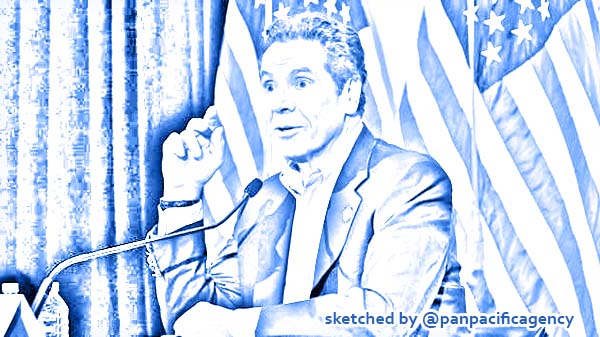Up to 2.7 million New Yorkers may be coronavirus-infected: Antibody study

New York Governor Andrew Mark Cuomo. Sketched by the Pan Pacific Agency.
NEW YORK, Apr 25, 2020, NBC News. Up to 2.7 million New Yorkers may have been infected with coronavirus — more than 10 times the number of confirmed cases, according to preliminary results from the state’s first antibody study. Less than two months ago, there were zero known cases here. How did the virus spread so dramatically so fast?
It was here well before New York City reported its “first” case on March 1, possibly as early as late January, researchers from Northeastern University say. They gave their model data to The New York Times, which reported nearly 11,000 may have been infected in the city by the time Gov. Andrew Cuomo and Mayor Bill de Blasio jointly announced our “patient zero,” NBC News reported.
“The horse had already left the barn” by the time the nation shut down, Cuomo said Friday. He cited research on the number of flights (13,000, carrying over 2 million people) from Europe, the globe’s second hot zone after China, to New York and New Jersey between January and March.
Knowing that now, “It was like watching a horrible train wreck in slow motion,” Cuomo said. “We closed the front door but left the back door wide open.”
New York City alone has more than 150,000 virus cases, almost a fifth of America’s total. The city’s health commissioner says that’s likely the “tip of the iceberg;” she wouldn’t be surprised if 1 million in the five boroughs have been exposed. Cuomo’s antibody study lends credence to her theory.
The study found 21 percent of NYC samples tested positive for the antibody, meaning they had COVID-19 at some point and recovered. That was the highest positivity rate of all regions tested in this initial round; Long Island had the second-highest positivity rate (16.7 percent). In total, of the 3,000 people randomly sampled from 40 locations in 19 counties, 13.9 percent had antibodies.
While the preliminary data suggests much more widespread infection, it means New York’s mortality rate is much lower than previously thought.
More than 16,000 people in New York have died of virus-related complications, with Cuomo adding another 422 to the toll Friday (the lowest single-day toll since March 31). With 271,000-plus confirmed cases, the mortality rate would be as high as 6 percent. With 2.7 million cases, it would be around 0.5 percent — much lower, though still much higher than the seasonal flu.
Cuomo was quick to caution, though, that the death toll was higher than even the state’s own official report — it counts deaths in hospitals and nursing homes, but not at-home deaths or other “probable” cases. In other words, the mortality rate is still hard to determine properly.
The sample size of the first antibody study was also relatively small. People were hastily recruited at shopping centers and grocery stores, meaning they were healthy enough to be out in public. Acknowledging some data points were inexact, Cuomo says more people will be tested over time.
He wanted a preliminary picture, he said. Further testing is underway and Cuomo’s team said they planned to share results as they emerge.
“We’ll have a larger and larger sample. But I want to see snapshots of what is happening with that rate,” the governor said. “Is it going up, is it flat, is it down? And it can really give us data to make decisions.”
Preliminary results from the antibody survey revealed that fourteen percent of New Yorkers tested positive for the antibody. Sarah Wallace reports.
Knowing how many people have antibodies could potentially help set policy on when to reopen parts of the state, the governor said. He projects New York revenues to decline $13.3 billion in the next state budget forecast, largely because of the pandemic. With the state’s “PAUSE” directive set to expire on May 15, Cuomo said Friday he’d decide in about a week whether to extend it further. Tied up in that executive order is the fate of New York schools.
Antibodies don’t guarantee a safe return to work, or to the classroom, for that matter. Dr. Anthony Fauci, the nation’s top infectious disease specialist, says it’s reasonable to assume a person who has antibodies will be immune from reinfection, based on experiences with past viruses. It’s unproven with respect to this novel coronavirus, however. Even if antibodies do grant that precious immunity, it’s not clear how long it would last, Fauci says. Three months? Six months? The hunt for answers is underway in labs across the country and the globe.
Dr. Craig Spencer, a Manhattan emergency room doctor who famously survived Ebola and has been a prominent social media voice during this crisis, was quick to point out the limitations of Cuomo’s initial study.
“It means a lot of us in NYC have been infected. But that’s not surprising news – we’ve seen high levels of cases for over a month,” Spencer tweeted. “It means the virus is STILL spreading in NYC. It means that the MAJORITY of us are still very susceptible! It means we still need to #StayHome.”